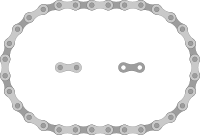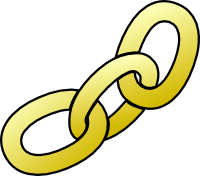Associations to the word «CHAIN»
Noun
- Supermarket
- Hash
- Polymer
- Daisy
- Carbohydrate
- Bondage
- Dipole
- Ankle
- Cuff
- Neutron
- Restaurant
- Intermediate
- Cipher
- Wrist
- Fence
- Molecule
- Bind
- Polymerase
- Neck
- Bicycle
- Encryption
- Inference
- Food
- Iron
- Bucket
- Cbc
- Rope
- Prometheus
- Bound
- Forward
- Fast
- Polymerization
- Monomer
- Clause
- Conformation
- Grocery
- Protester
- Adapter
- Hydrocarbon
- Zeus
- Stitch
- Chain
- Pizza
- Zero
- Compression
- Variable
- Authentication
- Connector
- Radiator
- Retardation
- Backbone
- Store
- Peptide
- Bookstore
- Fission
- Burger
- Residue
- Collagen
- Acid
- Cleavage
- Logistics
- Retailer
- Qc
- Bracelet
- Hamburger
- Phosphorylation
- Reaction
- Linkage
- Dangling
- Algorithm
- Lipid
Adjective
Adverb
Wiktionary
CHAIN, noun. A series of interconnected rings or links usually made of metal.
CHAIN, noun. A series of interconnected things.
CHAIN, noun. A series of stores or businesses with the same brand name.
CHAIN, noun. (chemistry) A number of atoms in a series, which combine to form a molecule.
CHAIN, noun. (surveying) A series of interconnected links of known length, used as a measuring device.
CHAIN, noun. (surveying) A long measuring tape.
CHAIN, noun. A unit of length equal to 22 yards. The length of a Gunter's surveying chain. The length of a cricket pitch. Equal to 20.12 metres. Equal to 4 rods. Equal to 100 links.
CHAIN, noun. (mathematics) (order theory) A totally ordered set, especially a totally ordered subset of a poset.
CHAIN, noun. (British) A sequence of linked house purchases, each of which is dependent on the preceding and succeeding purchase (said to be "broken" if a buyer or seller pulls out).
CHAIN, noun. That which confines, fetters, or secures; a bond.
CHAIN, noun. (nautical) (in the plural) Iron links bolted to the side of a vessel to bold the dead-eyes connected with the shrouds; also, the channels.
CHAIN, noun. (weaving) The warp threads of a web.
CHAIN, verb. (transitive) To fasten something with a chain.
CHAIN, verb. (intransitive) To link multiple items together.
CHAIN, verb. (transitive) To secure someone with fetters.
CHAIN, verb. (transitive) To obstruct the mouth of a river etc with a chain.
CHAIN, verb. (computing) To relate data items with a chain of pointers.
CHAIN, verb. (computing) To be chained to another data item.
CHAIN, verb. (transitive) To measure a distance using a 66-foot long chain, as in land surveying.
CHAIN, verb. (transitive) (computing) (rare) (associated with Acorn Computers) To load and automatically run (a program).
CHAIN BOAT, noun. A boat fitted up for recovering lost cables, anchors, etc.
CHAIN CASE, noun. Synonym of gear case.
CHAIN CASES, noun. Plural of chain case
CHAIN COMPLEX, noun. (mathematics) A sequence of Abelian groups, together with a sequence of boundary homomorphisms
CHAIN COMPLEXES, noun. Plural of chain complex
CHAIN DRIVE, noun. A transmission system in which power is transferred to the wheels by means of a chain.
CHAIN FERN, noun. A fern of any of several species of two genera:
CHAIN FERN, noun. Woodwardia, native to the Northern Hemisphere.
CHAIN FERN, noun. Tmesipteris, native to the South Pacific
CHAIN FERRY, noun. (nautical) A ferry that is pulled through the water via an attached chain
CHAIN GANG, noun. (US) a group of convicts chained together to work outside the confines of a prison.
CHAIN GANGS, noun. Plural of chain gang
CHAIN GUARD, noun. A compartment that encloses the chain and sprocket assemblies of a bicycle
CHAIN GUN, noun. A machine gun or autocannon that uses an external power source via a continuous loop of chain.
CHAIN GUNS, noun. Plural of chain gun
CHAIN LETTER, noun. A letter that is mailed successively to different recipients, with each recipient being instructed in the body of the letter to mail the letter to another person or persons.
CHAIN LETTERS, noun. Plural of chain letter
CHAIN LIGHTNING, noun. Lightning in angular, zigzag, or forked flashes.
CHAIN LOCKER, noun. (nautical) a space in the forward part of the ship, typically beneath the bow in front of the foremost collision bulkhead, that contains the anchor chain when the anchor is secured for sea.
CHAIN LOCKERS, noun. Plural of chain locker
CHAIN MAIL, noun. A flexible defensive armor, made of a mesh of interlinked metal rings.
CHAIN MAIL, noun. Chain letters, taken collectively.
CHAIN OF COMMAND, noun. (military) The command hierarchy or structure in which one rank obeys the one above it, which obeys the one above it, and so forth.
CHAIN OF CUSTODY, noun. (legal) (chemistry) The documentation showing the full process of acquisition, transfer, handling and disposition of physical or electronic materials.
CHAIN OF TITLE, noun. (legal) In the law of real property, a series of documents recorded in the appropriate government repository which establish the passage of a parcel of property from owner to owner, ideally back to the first owner to reduce the property to private ownership.
CHAIN PIPE, noun. (nautical) An opening in the deck, lined with iron, through which the cable is passed into the lockers or tiers.
CHAIN PUMP, noun. A water pump consisting of a series of buckets on a chain, wheel or drum
CHAIN REACTION, noun. (physics) A nuclear reaction in which particles produced by the fission of one atom trigger fissions of other atoms.
CHAIN REACTION, noun. (idiomatic) A series of events, each one causing the next.
CHAIN REACTIONS, noun. Plural of chain reaction
CHAIN RULE, noun. (calculus) A formula for computing the derivative of the functional composition of two or more functions.
CHAIN SAW, noun. Alternative spelling of chainsaw
CHAIN SAWS, noun. Plural of chain saw
CHAIN SICKLE, noun. A Japanese weapon evolved from the sickle; the kusarigama.
CHAIN SMOKER, noun. One who smokes continuously, by lighting one cigarette when they finish another, as in a chain.
CHAIN SMOKER, noun. One who habitually smokes a lot.
CHAIN STITCH, noun. An ornamental stitch like the links of a chain, used in crocheting, sewing, and embroidery.
CHAIN STITCH, noun. (machine sewing) A stitch in which the looping of the thread or threads forms a chain on the underside of the work; the loop stitch, as distinguished from the lock stitch.
CHAIN STITCHES, noun. Plural of chain stitch
CHAIN STORE, noun. A retail outlet that is one of a group of similar establishments having common format, contents, ownership and management.
CHAIN STORES, noun. Plural of chain store
CHAIN STORY, noun. A story, each section of which is written by a different author picking up where the previous one left off.
CHAIN TIE, noun. (architecture) A tie consisting of a series of connected iron bars or rods.
CHAIN TOWER, noun. Either of a pair of structures built on each side of a river or harbour mouth from which defensive chains were raised or lowered
CHAIN TOWERS, noun. Plural of chain tower
Dictionary definition
CHAIN, noun. A series of things depending on each other as if linked together; "the chain of command"; "a complicated concatenation of circumstances".
CHAIN, noun. (chemistry) a series of linked atoms (generally in an organic molecule).
CHAIN, noun. A series of (usually metal) rings or links fitted into one another to make a flexible ligament.
CHAIN, noun. (business) a number of similar establishments (stores or restaurants or banks or hotels or theaters) under one ownership.
CHAIN, noun. Anything that acts as a restraint.
CHAIN, noun. A unit of length.
CHAIN, noun. British biochemist (born in Germany) who isolated and purified penicillin, which had been discovered in 1928 by Sir Alexander Fleming (1906-1979).
CHAIN, noun. A series of hills or mountains; "the valley was between two ranges of hills"; "the plains lay just beyond the mountain range".
CHAIN, noun. A linked or connected series of objects; "a chain of daisies".
CHAIN, noun. A necklace made by a stringing objects together; "a string of beads"; "a strand of pearls";.
CHAIN, verb. Connect or arrange into a chain by linking.
CHAIN, verb. Fasten or secure with chains; "Chain the chairs together".
Wise words
Four things come not back. The spoken word, the sped arrow,
the past life, ad the neglected opportunity.









